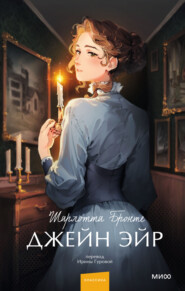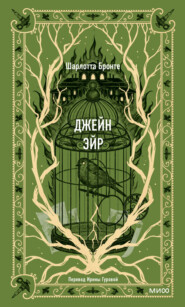По всем вопросам обращайтесь на: info@litportal.ru
(©) 2003-2024.
✖
Villette
Настройки чтения
Размер шрифта
Высота строк
Поля
On awaking with daylight, a trickling of water caught my ear. Behold! there she was risen and mounted on a stool near the washstand, with pains and difficulty inclining the ewer (which she could not lift) so as to pour its contents into the basin. It was curious to watch her as she washed and dressed, so small, busy, and noiseless. Evidently she was little accustomed to perform her own toilet; and the buttons, strings, hooks and eyes, offered difficulties which she encountered with a perseverance good to witness. She folded her night-dress, she smoothed the drapery of her couch quite neatly; withdrawing into a corner, where the sweep of the white curtain concealed her, she became still. I half rose, and advanced my, head to see how she was occupied. On her knees, with her forehead bent on her hands, I perceived that she was praying.
Her nurse tapped at the door. She started up.
"I am dressed, Harriet," said she; "I have dressed myself, but I do not feel neat. Make me neat!"
"Why did you dress yourself, Missy?"
"Hush! speak low, Harriet, for fear of waking the girl" (meaning me, who now lay with my eyes shut). "I dressed myself to learn, against the time you leave me."
"Do you want me to go?"
"When you are cross, I have many a time wanted you to go, but not now.
Tie my sash straight; make my hair smooth, please."
"Your sash is straight enough. What a particular little body you are!"
"It must be tied again. Please to tie it."
"There, then. When I am gone you must get that young lady to dress you."
"On no account."
"Why? She is a very nice young lady. I hope you mean to behave prettily to her, Missy, and not show your airs."
"She shall dress me on no account."
"Comical little thing!"
"You are not passing the comb straight through my hair, Harriet; the line will be crooked."
"Ay, you are ill to please. Does that suit?"
"Pretty well. Where should I go now that I am dressed?"
"I will take you into the breakfast-room."
"Come, then."
They proceeded to the door. She stopped.
"Oh! Harriet, I wish this was papa's house! I don't know these people."
"Be a good child, Missy."
"I am good, but I ache here;" putting her hand to her heart, and moaning while she reiterated, "Papa! papa!"
I roused myself and started up, to check this scene while it was yet within bounds.
"Say good-morning to the young lady," dictated Harriet. She said, "Good-morning," and then followed her nurse from the room. Harriet temporarily left that same day, to go to her own friends, who lived in the neighbourhood.
On descending, I found Paulina (the child called herself Polly, but her full name was Paulina Mary) seated at the breakfast-table, by Mrs. Bretton's side; a mug of milk stood before her, a morsel of bread filled her hand, which lay passive on the table-cloth: she was not eating.
"How we shall conciliate this little creature," said Mrs. Bretton to me, "I don't know: she tastes nothing, and by her looks, she has not slept."
I expressed my confidence in the effects of time and kindness.
"If she were to take a fancy to anybody in the house, she would soon settle; but not till then," replied Mrs. Bretton.
CHAPTER II.
PAULINA
Some days elapsed, and it appeared she was not likely to take much of a fancy to anybody in the house. She was not exactly naughty or wilful: she was far from disobedient; but an object less conducive to comfort – to tranquillity even – than she presented, it was scarcely possible to have before one's eyes. She moped: no grown person could have performed that uncheering business better; no furrowed face of adult exile, longing for Europe at Europe's antipodes, ever bore more legibly the signs of home sickness than did her infant visage. She seemed growing old and unearthly. I, Lucy Snowe, plead guiltless of that curse, an overheated and discursive imagination; but whenever, opening a room-door, I found her seated in a corner alone, her head in her pigmy hand, that room seemed to me not inhabited, but haunted.
And again, when of moonlight nights, on waking, I beheld her figure, white and conspicuous in its night-dress, kneeling upright in bed, and praying like some Catholic or Methodist enthusiast – some precocious fanatic or untimely saint – I scarcely know what thoughts I had; but they ran risk of being hardly more rational and healthy than that child's mind must have been.
I seldom caught a word of her prayers, for they were whispered low: sometimes, indeed, they were not whispered at all, but put up unuttered; such rare sentences as reached my ear still bore the burden, "Papa; my dear papa!" This, I perceived, was a one-idea'd nature; betraying that monomaniac tendency I have ever thought the most unfortunate with which man or woman can be cursed.
What might have been the end of this fretting, had it continued unchecked, can only be conjectured: it received, however, a sudden turn.
One afternoon, Mrs. Bretton, coaxing her from her usual station in a corner, had lifted her into the window-seat, and, by way of occupying her attention, told her to watch the passengers and count how many ladies should go down the street in a given time. She had sat listlessly, hardly looking, and not counting, when – my eye being fixed on hers – I witnessed in its iris and pupil a startling transfiguration. These sudden, dangerous natures —sensitive as they are called – offer many a curious spectacle to those whom a cooler temperament has secured from participation in their angular vagaries. The fixed and heavy gaze swum, trembled, then glittered in fire; the small, overcast brow cleared; the trivial and dejected features lit up; the sad countenance vanished, and in its place appeared a sudden eagerness, an intense expectancy. "It is!" were her words.
Like a bird or a shaft, or any other swift thing, she was gone from the room. How she got the house-door open I cannot tell; probably it might be ajar; perhaps Warren was in the way and obeyed her behest, which would be impetuous enough. I – watching calmly from the window – saw her, in her black frock and tiny braided apron (to pinafores she had an antipathy), dart half the length of the street; and, as I was on the point of turning, and quietly announcing to Mrs. Bretton that the child was run out mad, and ought instantly to be pursued, I saw her caught up, and rapt at once from my cool observation, and from the wondering stare of the passengers. A gentleman had done this good turn, and now, covering her with his cloak, advanced to restore her to the house whence he had seen her issue.
I concluded he would leave her in a servant's charge and withdraw; but he entered: having tarried a little while below, he came up-stairs.
His reception immediately explained that he was known to Mrs. Bretton. She recognised him; she greeted him, and yet she was fluttered, surprised, taken unawares. Her look and manner were even expostulatory; and in reply to these, rather than her words, he said, – "I could not help it, madam: I found it impossible to leave the country without seeing with my own eyes how she settled."
"But you will unsettle her."
"I hope not. And how is papa's little Polly?"
This question he addressed to Paulina, as he sat down and placed her gently on the ground before him.
"How is Polly's papa?" was the reply, as she leaned on his knee, and gazed up into his face.
It was not a noisy, not a wordy scene: for that I was thankful; but it was a scene of feeling too brimful, and which, because the cup did not foam up high or furiously overflow, only oppressed one the more. On all occasions of vehement, unrestrained expansion, a sense of disdain or ridicule comes to the weary spectator's relief; whereas I have ever felt most burdensome that sort of sensibility which bends of its own will, a giant slave under the sway of good sense.
Mr. Home was a stern-featured – perhaps I should rather say, a hard-featured man: his forehead was knotty, and his cheekbones were marked and prominent. The character of his face was quite Scotch; but there was feeling in his eye, and emotion in his now agitated countenance. His northern accent in speaking harmonised with his physiognomy. He was at once proud-looking and homely-looking. He laid his hand on the child's uplifted head. She said – "Kiss Polly."
He kissed her. I wished she would utter some hysterical cry, so that I might get relief and be at ease. She made wonderfully little noise: she seemed to have got what she wanted —all she wanted, and to be in a trance of content. Neither in mien nor in features was this creature like her sire, and yet she was of his strain: her mind had been filled from his, as the cup from the flagon.
Indisputably, Mr. Home owned manly self-control, however he might secretly feel on some matters. "Polly," he said, looking down on his little girl, "go into the hall; you will see papa's great-coat lying on a chair; put your hand into the pockets, you will find a pocket-handkerchief there; bring it to me."
She obeyed; went and returned deftly and nimbly. He was talking to Mrs. Bretton when she came back, and she waited with the handkerchief in her hand. It was a picture, in its way, to see her, with her tiny stature, and trim, neat shape, standing at his knee. Seeing that he continued to talk, apparently unconscious of her return, she took his hand, opened the unresisting fingers, insinuated into them the handkerchief, and closed them upon it one by one. He still seemed not to see or to feel her; but by-and-by, he lifted her to his knee; she nestled against him, and though neither looked at nor spoke to the other for an hour following, I suppose both were satisfied.
During tea, the minute thing's movements and behaviour gave, as usual, full occupation to the eye. First she directed Warren, as he placed the chairs.

















